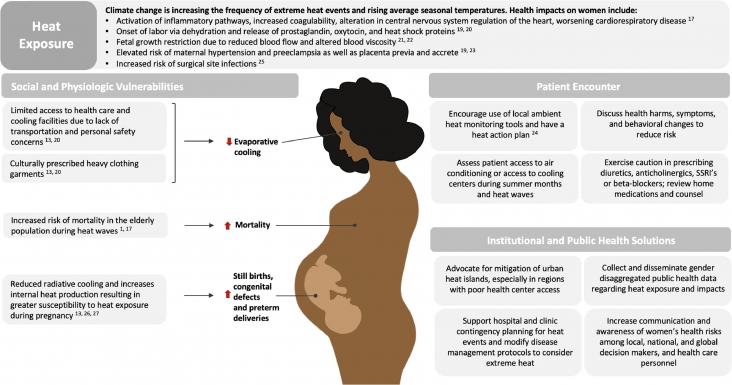Elsevier,
Obstetrics and Gynecology Clinics of North America, Volume 49, Issue 3, 2022, Pages 581-590
This chapter advances Goals 3 and 5 by discussing how systematic forensic evaluation and treatment of sexual assault and IPV victims are important aspects of care for these patients.
An Article on readmission to depressive symptoms among people who are refugees, in the context of SDGs 3 and 10, focusing specifically on the effectiveness and cost-effectiveness of care practices for this population in Germany.

Climate change threatens to widen existing gender-related health disparities as well as socioeconomic disparities among women.
Elsevier,
American Journal of Obstetrics & Gynecology MFM, Volume 4, Issue 2, March 2022, article 100482.
Perinatal mental health needs, including suicidal ideation, are often first recognized beyond 8 weeks postpartum. These data should be taken into consideration in policymaking discussions pertaining to the approach to medical care continuity and postpartum healthcare coverage.
This study reinforces understanding that adverse incidents have a profound impact on the mental health and wellbeing of healthcare professionals.
One in five older adults experience symptoms of depression and anxiety.
It is important to identify factors that mitigate the impact of racism-related stress and adversity on birth outcomes.
The menopausal transition is often accompanied by psycho-vegetative symptoms, including stress and anxiety symptoms. Several psychological interventions are available for stress reduction.
Maturitas, Volume 164, October 2022, Pages 46-51.
Additional sources of information to self-reports are needed for the detection of disabling mental and musculoskeletal disorders prior to older age.
Research on the impacts of climate change on mental health and mental health-related systems will assist decision-makers to develop robust evidence-based mitigation and adaptation policies and plans with the potential for broad benefits to society and the environment.
